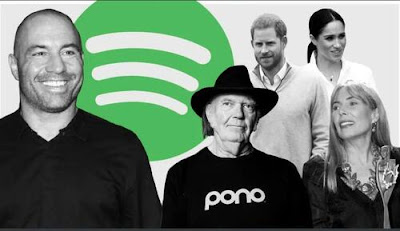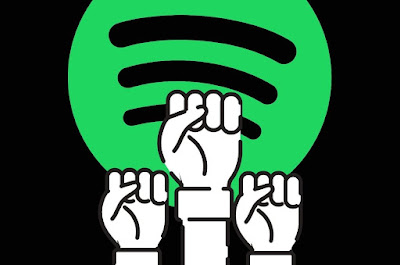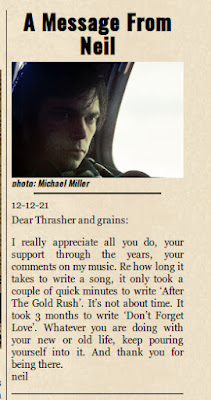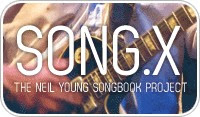VIEWPOINTS: The Neil Young, Spotify, & Joe Rogan Controversies
Here are two VIEWPOINTS on the recent Neil Young, Spotify, & Joe Rogan controversies swirling about since late January.
The first VIEWPOINT is from Neil Young Archives "World Health Organization Chief defends singer over SPOTIFY ‘vaccine lies’ podcasts" (via The Times of London, 1-28-22). The second VIEWPOINT is "Neil, Joni, Have You Forgotten Your Own?" | THE LONG HAULa musician, specifically, an American singer-songwriter and fiddler based in Nashville,TN.
VIEWPOINT #1: "World Health Organization Chief defends singer over SPOTIFY ‘vaccine lies’ podcasts":
The director-general of the World Health Organisation has backed Neil Young in his dispute with the music streaming giant Spotify for hosting the popular podcaster Joe Rogan, who has given a platform to anti-vax conspiracy theorists.
Young, 76, said that Rogan’s show spread harmful lies about vaccines and Covid-19 that put lives at risk.
In a tweet Tedros Adhanom Ghebreyesus, 56, thanked the veteran rock star “for standing up against misinformation and inaccuracies around #COVID19 vaccination”, adding: “Public and private sector, in particular social media platforms, media, individuals — we all have a role to play to end this pandemic and infodemic.”
His comments came as #deletespotify trended on social media, with many of Young’s fans and supporters of his stance calling for a boycott of the streaming platform.
The issue has proved divisive among musicians, however, with Dave Draiman, front man of the heavy metal band Disturbed, saying that he “applauded” Spotify for removing Young’s music.
Addressing Daniel Ek, Spotify’s chief executive, he tweeted: “I applaud you and Spotify for making the RIGHT call, preserving #FreeSpeech and not capitulating to the mob. I may not agree with everything Joe Rogan or his guests say, but they’re entitled to have the forum to say it.”
Rogan, a stand-up comedian and TV personality, clarified last year that he was “not an anti-vax person” before airing an episode of his podcast that led to 270 doctors, scientists and healthcare professionals signing an open letter last month raising fears over his “concerning history” discussing the pandemic.
They asked the streaming giant to implement a policy for dealing with misinformation, citing his interview with Dr Robert Malone, a virologist who conducted early research into the mRNA technology behind several Covid-19 vaccines but later became critical of the treatments.
The open letter criticised both men for promoting conspiracy theories, including the false claim that hospitals were financially incentivised to falsely diagnose deaths as having been caused by Covid-19.
Rogan, who has an exclusive $100 million deal with Spotify, said: “I believe they’re safe and encourage many people to take them.”
He refused to back down on claims that young people did not “need” the vaccine but added that he should not be regarded as a source of scientific advice, saying: “I’m not a doctor . . . I’m not a respected source of information, even for me.”
Dr Malone was also criticised for wrongly stating that getting vaccinated put people who had already had Covid at higher risk. He claimed that world leaders had hypnotised the public into supporting vaccines, drawing parallels between the pandemic and the rise of the Nazi party in 1930s Germany.
Meanwhile, the American radio station SiriusXM announced on Thursday that it was bringing Neil Young Radio back to its airwaves with a second limited run on the platform.
Young, whose music was being removed from Spotify last night, had warned the company that “they can have Rogan or Young. Not both” after reading the Covid experts’ letter.
His fans rallied behind the protest. Daryl Hannah, the American actress, and Kate Nash, the British singer, were among those who voiced support. “I really admire Neil Young for pulling his music from Spotify,” Nash said.
Margo Price, an American country singer, added: “If all artists were as punk rock as Neil Young maybe we wouldn’t be getting absolutely screwed by corporate streaming companies.”
Young’s decision was backed by his record labels, despite the singer describing it as a “costly move” because Spotify accounts for 60 per cent of his streaming revenue. His partners include Hipgnosis Songs Fund, a UK- listed investment company, which acquired 50 per cent of the rights to his 1,180-song catalogue last January.
Young is estimated to have earned $1.8 million from his ten most popular songs on Spotify, according to an analysis by The Times. Heart of Gold, his top track on the streaming service, has 236 million plays, making up to $873,000 for the artist.
Young’s tracks will remain on Apple Music, Amazon and other platforms, as well as the Neil Young Archives, his passion-project website and app. The archives have nearly 26,000 subscribers, who pay between $20 and $100 to access the service, meaning that it generates between £520,000 and £2.6 million in revenue. The UK is its second-largest market outside of the US.
Phil Baker, who runs the website, said that Young did not maintain the site for the money. Instead, it is a place where fans can listen to his music in “HD” quality and learn about the backstory to his tracks. This has been a previous bone of contention for Young with Spotify, which compresses audio files on its platform. “Rather than trying to create a physical archive in some museum, he really wanted to take advantage of the internet and create something that is open 24 hours a day around the world,” Baker said.
John Mulvey, editor of the music magazine Mojo, said that Young’s investment in his own platform had helped to put him in a strong position to take a moral stand against Spotify.
“He can make tough calls because he has been canny enough and invested enough in development that means he’s got an alternative,” Mulvey said.
“He’s the kind of artist who encourages obsession. People who like Neil Young tend to love Neil Young, and they’re invested in listening to a hell of a lot of Neil Young. As a consequence, it becomes quite different from the Spotify grazing experience of interacting with an artist’s catalogue.”
Spotify, a Swedish company based in Stockholm, said: “We want all the world’s music and audio content to be available to Spotify users. With that comes great responsibility in balancing both safety for listeners and freedom for creators. We have detailed content policies in place and we’ve removed over 20,000 podcast episodes related to Covid since the start of the pandemic. We regret Neil’s decision to remove his music from Spotify, but hope to welcome him back soon.”
In backing Joe Rogan over Neil Young, Spotify has put podcasting before music, which is not insignificant for a $32 billion company founded to help songwriters beat piracy (Jake Kanter writes).
But Rogan, 54, is no ordinary content creator. The brash American comedian and cage-fighting commentator is one of Spotify’s biggest audio bets. The Swedish company spent $100 million in 2020 on exclusive rights to his podcast, The Joe Rogan Experience, helping it to overtake Apple as a leader in the audio field. The show began in 2009 and has become a phenomenon. Although Spotify has not released listening figures, The Joe Rogan Experience is the service’s most popular podcast in the US, Britain and Canada.
Rogan is nothing if not prolific, having hosted 1,770 episodes in 11 years, regularly posting more than once a week. Famous guests include Elon Musk, who spawned internet memes by smoking cannabis during the recording.
He has built his brand on putting freedom of expression first and giving a platform to controversial figures in sprawling conversations. A recent episode with Professor Jordan Peterson, the divisive Canadian author, runs to more than four hours and takes in subjects including climate change and race. On the latter, Peterson said: “Unless you are talking to someone who is like 100 per cent African, from the darkest place where they are not wearing any clothes all day . . . the term ‘black’ is weird.”
It is Rogan’s embrace of Covid-19 conspiracies that Young has spotlighted. Rogan has said that healthy young people need not be jabbed. Last month he hosted Dr Robert Malone, a vaccine sceptic who was banned from Twitter for breaking its Covid-19 misinformation rules.
Rogan has kept “full creative control” over his show since selling to Spotify and it has stood by him. Others, including YouTube, have deleted some of his content. If more artists go the way of Young, Spotify may be forced to reassess its support for one of its biggest stars.
VIEWPOINT #2, an alternative VIEWPOINT, from "Neil, Joni, Have You Forgotten Your Own?" | THE LONG HAUL
The fight against Spotify and Joe Rogan has been all over the news the past couple weeks.
Starting with Neil Young, big-name artists, especially those synonymous with the era of ’60s protest music, have begun to pull their music from Spotify due to the company’s unwillingness to take down Rogan’s podcast, which they blame for spreading misinformation about COVID-19 and vaccines. Joni Mitchell followed suit, writing on her website that she “decided to remove all of my music from Spotify” because “irresponsible people are spreading lies that are costing people their lives.”
I have to admit, I’m feeling a bit slapped in the face by this whole thing. Neil and Joni are some of my biggest musical heroes, and I have been strongly influenced by the protest music of their era. I strive to be the kind of artist who stands up for what I believe in and uses music to make my voice heard. I’m glad that they are using their power to try to further the cause of life-saving vaccines, and to support science over pseudoscience. And I understand that they are both survivors of polio and therefore feel personally close to the cause. My issue is that THIS is the battle they chose to fight with Spotify.
In regard to Rogan, the argument against Spotify hosting him is essentially, “Hey, Joe, you have a huge platform here, it’s your responsibility to use it for good!” Similarly, Joni and Neil have a huge platform, but in a comparably very small space. As Sean Jewell, editor of roots music website American Standard Time and owner of Seattle-based American Standard Time Records, pointed out in a Facebook post, Mitchell has 7 million listeners a month on Spotify. Joe Rogan has 11 million listeners PER SHOW. This just feels like such a waste of a power play by these great artists. Why throw away your protest power on something so far outside of your zone of influence when you could be doing so much more with it in your own community?
Over the past few years, we’ve seen streaming services basically destroy the economy of the music industry. Musicians are making less than a penny on each stream while selling pitiful numbers of digital and physical music. Record labels are broke and unable to invest in any kind of artist development and growth. The industry has been essentially driven into the ground by these hugely profitable streaming platforms, and here come Neil and Joni, using their political and social power against Spotify … because of JOE ROGAN??? Are you kidding me?
Personally, I don’t have a strong opinion about Spotify’s responsibility to police the podcasts that they host. It’s hard to stomach anti-vaxxers in the best of times. I understand the issue with Rogan’s huge listener base, and I think it’s a valuable conversation to have. But Spotify was built primarily on the blood, sweat, tears, time, and hard-earned dollars of musicians. I just wish that those big artists, who truly have the power to make a difference for us small and even medium-sized fish at the bottom, would have taken a beat and realized that they could have made this play so much more effectively, and for much more relevant and impactful reasons. What if they had used that power to ask for higher artist royalties? Or exposed the unique (and much more favorable) deals that major labels get from streaming as compared to indie and small-label artists? It could have taken off like wildfire. We could have seen an industrywide protest that might have made a difference for so many people. Instead, we are sitting here talking about the content and consequence of Joe Rogan’s podcast. Why aren’t we talking about the fact that Rogan was paid $100 million by Spotify for the right to stream his podcast? Yes, this is the same company saying they “can’t afford” to pay musicians more.
Joni and Neil lived through a very different era in the music industry, one in which big money was made on records that are only mid-level successful by today’s standards. That’s because everyone who was listening had to pay for the music. I feel these old industry heroes have forgotten us little guys, drowning here at the bottom, and even the middle. I have 40,000 to 80,000 listeners per month on Spotify, and over 8 million streams in total, yet I can’t pay my bills with royalties for even one month if I can’t tour. Sometimes I imagine how much different my life, my art, my live show, my capacity to create could be if I were paid even a penny for each of those streams.
Here we have an entire class of musicians that have barely been able to get off the ground and tour since 2020, and it’s nigh on impossible to eke out a living from your recorded music alone. Every time this conversation about Spotify’s impossible business model comes up among my peers (and it does often), we say “Yeah, but we don’t have the power. We’re stuck with this streaming model that is impossible to live on and also impossible to quit. We really need some big artists to take this on because they could start a movement that the services will actually care about.”
I’m just so disappointed that when the big artists finally spoke up, it was wasted on Joe Rogan’s podcast, which is an inevitable, albeit frustrating, voice in our society. It’s time for us to get smart about how we’re going to move forward as a creative class, and ask our heroes and leaders to do the same.
- The COVID Years: Neil Young Asks Spotify to Remove Music Over Vaccine Disinformation, Then Retracts Letter
- Joni Mitchell Joins Neil Young In Removing Her Music from Spotify
- Comments of the Moment: Neil Young's "The COVID Years", Joe Rogan, Spotify and Vaccine Disinformation
- Crosby, Stills, Nash & Young Reunite ... In Opposition to SPOTIFY
- Neil Young to SPOTIFY Employees: "Get out of that place before it eats up your soul."
- Neil Young Clears Up Some Things: "I was misinformed, too!" | NYA
Labels: #disCERNment, #DontForgetLove, archives, neil young, nya, spotify


































 Human Highway
Human Highway

















 Concert Review of the Moment
Concert Review of the Moment





 This Land is My Land
This Land is My Land

 FREEDOM In A New Year
FREEDOM In A New Year









 *Thanks Neil!*
*Thanks Neil!*




![[EFC Blue Ribbon - Free Speech Online]](http://www.thrasherswheat.org/gifs/free-speech.gif)











 The Unbearable Lightness of Being Neil Young
The Unbearable Lightness of Being Neil Young Pardon My Heart
Pardon My Heart



 "We're The Ones
"We're The Ones  Thanks for Supporting Thrasher's Wheat!
Thanks for Supporting Thrasher's Wheat!




 This blog
This blog 
 (... he didn't kill himself either...)
#AaronDidntKillHimself
(... he didn't kill himself either...)
#AaronDidntKillHimself









































































 Neil Young's Moon Songs
Neil Young's Moon Songs




 Civic Duty Is Not Terrorism
Civic Duty Is Not Terrorism Orwell (and Grandpa) Was Right
Orwell (and Grandpa) Was Right


 What's So Funny About
What's So Funny About 



26 Comments:
I look forward to Neil joining Joe for a chat some day soon. Surely Joe has reached out and surely Neil would oblige.
VIEWPOINT #3:
It is terrible to get old sometimes.
I read the post carefully and I am unhappy with myself for not raising this issue sooner.
Many people are talking about "science" and "pseudo-science" and why it is so important to know the difference. In the philosophy of science, this is known as "the demarcation issue." Popper and Lakatos, both scientists and philosophers, wrote the classic papers on the subject. What is essential here is that Popper regarded Freudian theory, Marxist theory, and Alder's theory as pseudo-science on the grounds that they literally could not be falsified. Whatever looked like disconfirmation was interpreted into the theoretical framework. Obviously, this is a problem. Lakatos is far more forgiving as he sees scientific theory as webs of hypotheses so that disconfirming instances are generally not sufficient grounds for ditching a theory.
what matters here are the targets of pseudo-science: all enormous contributions to human insight and knowledge. Whatever we say now about Freudian theory- its essential irrelevance to actual clinical treatment- there are still many ways in which it contributes to our knowledge of human beings (just think of the subconscious ocean).
The crap we hear on social media does not rise to the level of pseudo-science. There are NO theories supporting any thesis regarding "anti-vaxxing" and there are no theories supporting vaccine caused autism hypotheses and so on. These are just bare claims and they seem intended as antagonism toward science and elites who actually comprehend science. We should not call simple "counter-claims" pseudo-science but "unsupported assertions." This goes on constantly and the inference to the best explanation here is the politics of assertions. (Don't forget as one "gathers evidence" there are many conditions, like what counts as evidence and how one observes to gather the right evidence, and what our best theories say for a research agenda, as in next questions, right questions.)
Shut it down, turn it off, and get subscriptions to "Science" and "New England Journal of Medicine."
@ Cubanpete - Neil joining Joe would probably be a big ratings winner, for sure. But can't see neil doing it.
@ Robi - most of the time.
@ Abner - thanks, as always, for the enlightenment.
Like others here, we're not too steeped in the Philosophers, such as Popper and Lakatos, and their theories.
and we'll say the following -- not to take anything away from the Philosophers, their teachings and adherents.
but we've found those Kindergarten teachings have served us well in life. The basic values in life are simple and not complex.
For us here @ TW, what matters is the free exchange of ideas in a cordial, non-combative manner.
Pls note this VIEWPOINT post here above with essentially diametrically opposed positions (altho not entirely). It is this span of thinking which we seek in our debates. Similar to the spirit of NY's Times-Contrarian.
Are not most -- if not all -- neil fans, "Contrarians", afterall?
With a free exchange of ideas and thru our powers of #disCERNment, we can sort out the truth and lies. Separate the wheat from the chaff, if you will.
we're so glad to have you here and others who raise the level of discourse above the deafening chatter of chaff hitting the cutting room floor.
peace
I'm sorry if I sounded like I was lecturing. I agree with you Thrasher.
Obviously it's not as simple as the musician from Tennessee would like to have it. The big names are not the ones who make the change, it's those millions of free-loaders who don't believe that music should be paid for. Maybe the days of making a living as a recording artist are over. There once was a time, when recordings artists did not make very much money with their records. Robert Johnson created his music for a handful of dollars and so did many pioneers of recorded popular music.
I still use my analog Leica-Kamera every once in a while, because I decided I can afford it. But as the poeple of Rochester, NY will tell you the times of analog photography are over, with the exception of a few very successful photographers and a handful of well-to-do amateurs.
So at what point does a market disruption based on new technology become a threat to cultural expression?
Sometimes it is hard to witness the young ones do terribly stupid things.
@Dionys. : You raise some profound issues that many are completely oblivious to, and I’m glad you’re bringing them to the fore. Creativity was never meant to be a profitable venture, nor was it ever a concerted attempt at competition. Yet it has been an extremely valuable effort in reflecting the culture it was created in, as well as a form of recording history for future generations. But as you mentioned; it will always be the outliers and rebels that always seem to move it forward. Unfortunately in the current version of the music industry, most of them will never be heard.
Picasso never made any money for his efforts, yet he was compelled to paint. Now his works have become priceless treasures for the wealthiest of collectors. Neil Young came into the music business at a time when there were individuals running the labels who allowed the artists to experiment and mature at their own rate. People in positions of power who were less concerned with making money, and more interested in facilitating great music that could move artists forward. Some of these people were musicians themselves who understood the process and allowed their artists the opportunity to make mistakes and grow.
Those days are long gone as the music industry has become a corporate nightmare. Artists like Neil Young couldn’t even get an opportunity to be heard in today’s environment. Fortunately he was able to maintain a long and productive career that allowed him the privilege of large fan base. Otherwise he would have probably been forced to work at a car dealership, instead of creating such remarkable records over the years.
The market disruption you mention started some time ago, and continues to gain momentum as technology continues to advance. I can’t see how anyone can actually make a living making music in the current environment, as streaming continues to grow. Artists are literally making spare change on steaming services and these people need to eat, and have shelter. The only artists that can actually survive this situation are the small percentage of artists who become today’s ‘latest flavor’. And there is so few that can actually sustain that kind of popularity, so they’ve all become disposable commodities. Simply making what money they can before the public falls for the next ‘flavor’.
With YouTube and other streaming sites the number of musicians attempting to find their audience has deluded the marketplace to the point where they become isolated voices calling out of the wilderness. Their chances of success continues to dwindle as more and more artists put their music out into the ether. The technology that was intended to help artists gain traction is the same technology that is pushing them off the radar.
These are important issues that need to be addressed if music and artistic ventures have any chance of survival, and I’m so glad you brought it up. Thanks.
Peace 🙏
Famous Faulkner quote (when receiving notice that he had been awarded the Nobel Prize for literature): "all that matters is the work."
Wittgenstein to the students who used to parrot his ideas: "do it the bloody hard way"
Basic values Thrasher?
Here's an idea to help artists earn more $ from streaming services. I'm not a computer geek but I'm guessing this could be done. Everyone who reads this goes to their favorite streaming service & creates a massive playlist of their favorites artists, turn the volume down & set it up to repeat. That would generate a ton of more streams/more $ for the artists & make use of that old computer many of us have that isn't being used anyway. There may be a downside that I'm not seeing but maybe it could lead to a great David vs Goliath story.
Many European countries explicitly define themselves to be "culture states". This concept provides for huge amounts in subsidies for cultural activities in literature, arts and music: "Swan Lake" the ballet by Tschaikowski tomorrow night in Munich for a 100,00 €, also Puccini's opera "Tosca" 160,00 €, both prices are the most expensive seats in the house. Cheapest ticket (standing) would be something like 9 -12 €. Without these subsidies the opera houses, theatres and concert venues would not be able to survive because nobody could afford prices that would have to be four times as high to make ends meet.
In addition there are foundations, grants and all kind of organizations to support artists. Musicians pay into a pension fund and into the mandatory public health insurance to make sure, they receive (very modest) benefits once they are old or can't work in their profession anymore. Even my self-employed son, who is working part-time as a sound technician (mostly small and medium sized acts, i.e. venues with audiences up to a couple of thousand) received bridge payments from the state of Bavaria and the Federal government during the pandemic, when everything was shut down. All of that is paid by someone like me with an income taxload of approximately 20% and a value added tax of 19% for most goods. (Clarification: I am a state official with a tenure, so my pension will be taken care of, and I pay just 50% of my health insurance directly, others have to make do with a lot less in monthly income.) I absolutely support this system because I rather have everybody pitching in, than art being dependent on more or less ignorant fat cats who afford themselves some culture, even if I never will be an opera star I am ready to support cultural expression even if it does not cater to the (bad) taste of the majority.
But there still is a whole sector of culture industry in Germany who are out on their own. If there are no concerts, no exhibitions, no book readings or plays to be presented there is no revenue. So with all this bolstering of the culture industries there obviously is a need for financial support that can not be covered, no matter how much money is poured into that bucket.
Neil Young concert's in Europe are yet another category. GA tickets range in the same price categories as the most expensive classical productions (see above). But I am pretty sure that not every single concert is breaking even when they move about in trucks and busses, sometimes with two crews in time-parallel operations to meet the dates, even when they calculate with synergy effects sharing stage set-ups with other major acts.
The Kids Are Alright - They listen to Spotify AND buy Vinyl!
A third party panel for Rogan/Young would be my preference.... like on Real Time with Bill Maher. But definitely NOT on Rogan's podcast. That would be feeding the bear.
As for the valid cry for more money piece, this shouldn't be over and it is a different focus that has needed to be adressed for sure. As Gillian and David sing
"Everything is free now, that's what they say
Everything I ever done, gotta give it away
Someone hit the big score, they figured it out
They were gonna do it anyway, even if it doesn't pay."
Somewhere in the loft there is an discarded IPod, still owned by my son with ten thousand songs as mp3 or other lossy formats (including a fair share of Neil Young's back catalogue). He never owned that music, he just had to have it all and at once. What he really owns in the sense that it will be part of the soundtrack of his life are the recordings of concerts that he attended and the tangibles that he paid for with his own cash. No, the kids never were and are not alright. They are exactly like us, sawing off the branch we are sitting on.
@Dionys: I didn't quite understand why you start talking world problems with nearly every topic, but hey: iPod says it all - Do you include in "they are exactly like us" that Fridays for Future is a risk of failure from the outset condemned because well-off children of well-off parents cannot change at all and that they will "exactly like use" fall for one of the bases of capitalism, namely the arousal of needs by all means (e.g. brand fetishism)? Then we would be of the same opinion on one point (but I'm also more of a pessimistic type)! But please don't give me Neil Young as my savior about "Ain't singin' for Pepsi, Ain't singin' for Coke". For example, I can only find brands that are "hot" right now on the "Listen" page in the Times-Contrarian. A look back: With his Archives I, he aroused the need for the then "hot" Bu-Ray players hardly anyone else (even those who already had a Blu-Ray found out that most of them didn't run the Archives). Honi soit qui mal i pense. And to the "Blue" advertising of e.g. Mercedes, BMW & VW, i.e. "Keep driving BIG cars for fun without a guilty conscience" I can think of another vehicle that begins with L.
As a small visible sign that he is much more consistent than around 10 years ago: After the interview with Zane Lowe in the Shangri-La Studios, I would like to seen him drive away in a small e-car instead of a big white Daimler vintage car (Mercedes 500?).
Picasso was financially and critically successful during his lifetime. Van Gogh is the modern artist who usually exemplifies for us the unsung visionary to go posthumous pop star. But Dan’s point still stands: art exists outside recognition. And Robert Johnson was about to break big right before his death, so you never know!
@Tomatron. Thanks for the correction, as I was thinking Van Gogh but for some reason I typed in Picasso.
Peace 🙏
Thrasher, Just want to thank you for this good faith effort at presenting a balance of viewpoints... I may have been a little insistent on this point in the past, so want to give credit where it's due.
The issue of streaming services cutting into artists' revenues is a genuine issue. Important for musicians to keep bringing this up. One of the underlying dynamics here is art, information, and personal expression being packaged as commodities. Conflict between civil liberties, open access to information, and private economic interests is a social tension point, no?
When it comes to NY's actions regarding Rogan and Spotify, I'm of the "tempest in a teapot" viewpoint, not because of Rogan or any other specifics, but simply because both NY and spotify have every right to make these calls regardless of why. Not saying there aren't other issues at play here, just that nothing's going to be solved by putting IP rights in question.
"Don't forget love."
Should have read: "Nothing's going to be solved by putting *anyone's* IP rights in question."
First of all I did not raise the "world problems", they have been around already, on NYA, here on this TW thread and elsewhere of course.
Second: I did not advertise Neil Young as a prophet or saviour with regards to an environmentally conscious future. On the contrary I pointed out before that Neil Young at many stages of his career follows a techno-romanticism which cannot be sustainable (Replacing the world's fleet of cars with electric vehicles?) And I also agree that this L-car resembles the technicist strategy promoted by Germany's car industry to counteract progressive (i.e. non car-based) concepts of mobility. However, I think that Neil Young is an example as an individual who seriously tries to disconnect himself and his lifestyle from what he perceives to be destructive. That includes dead ends and labyrinthic meanderings.
My third point is, that I am very pleased after almost 30 years in geographical research and education that there finally is a Fridays for Future generation who paid attention, but I am very reluctant to accept their hyper-moralistic lecturing on environmental issues while at the same time these generations have their own problems with brand-fetishism or other concepts of exclusivity. Sometimes there also appears to be an (artificial) generation clash: the younger generations in their ahistorical world view do not see that without their parents' generation they would not be able to take their stand. I repeat myself: concerning the disruptive and destructive music business of today the kids are just like their parents, they want to have the cake and eat it.
Maybe Robert Johnson could have made it big, had he lived longer, but that cannot be proved. Looking at let's say the back catalogue of a record label like Arhoolie records and other outfits that rescued original American music, I still think that my comparison is valid. Out of the many musicians of the first half of the 20th century very few actually made it big and some of them only because they were re-discovered or received royalties from record sales by other acts who covered their songs. There was a time, when recording artists were not paid what we later on came to believe was fair, and we are there again.
For those of us who have come of age in an era host to a plethora of creative stars in popular music with lucrative careers, indeed it seems as though it was always that way, and that we’ve strayed from the path in the age of streaming. But I agree with y’all: only a handful, historically, ever make the big time.
It goes without saying that a “would have” statement cannot be proven. But it’s an assertion that’s supported by the trajectory of Johnson’s life just before his death in ‘38. He was the last of the original Delta blues singers, Robert Johnson was regarded as the best in the business by his peers. His enigmatic persona was noted by those who encountered him on the road. His first single “Terraplane Blues” was a regional hit the year before he died. Starmaker John Hammond wanted him specifically for a major showcase of the blues, jazz, and gospel cream of the crop at Carnegie Hall and had been writing about Robert Johnson’s work around this time. Hammond (who is known for bringing Billie Holiday, Benny Goodman, Aretha Franklin, Bob Dylan, and many other household names into the limelight) was just barely too late in featuring Johnson, who had recently been poisoned to death. Hammond booked Big Bill Broonzy in his stead, who went on to international fame. Even if RJ had bombed that night, Hammond was such a patron he would likely have continued to bolster him. It’s a stretch to imagine that Johnson, who became a worldwide phenomenon and major influence in the early 60s, would not have caught on with the wider (and whiter) world in his prime of life.
THat's plausible. Here's to Robert Johnson.
He was one hell of a songwriter.
Perhaps Dionys sees world problems in all the questions (whatever) because they are now within every question. Seems overt to me. The more difficult the question, the more dense, the more likely that we are grabbing the tail. I believe it is called ecology. I will stop now as I do want to be a lecturing asshole.
not,, ha ha ha.
Post a Comment
<< Home